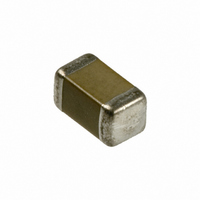C1206Y104K3RACTU Kemet, C1206Y104K3RACTU Datasheet - Page 8

C1206Y104K3RACTU
Manufacturer Part Number
C1206Y104K3RACTU
Description
CAP CER 0.1UF 25V X7R 1206
Manufacturer
Kemet
Series
FF-CAPr
Specifications of C1206Y104K3RACTU
Capacitance
0.1µF
Voltage - Rated
25V
Tolerance
±10%
Temperature Coefficient
X7R
Mounting Type
Surface Mount, MLCC
Operating Temperature
-55°C ~ 125°C
Features
Floating Electrode, Soft Termination
Applications
Automotive, Boardflex Sensitive
Ratings
AEC-Q200
Package / Case
1206 (3216 Metric)
Size / Dimension
0.126" L x 0.063" W (3.20mm x 1.60mm)
Thickness
0.78mm
Voltage Rating
25 Volts
Operating Temperature Range
- 55 C to + 125 C
Temperature Coefficient / Code
X7R
Product
Flexible Termination MLCCs
Dimensions
1.6 mm W x 3.4 mm L x 0.78 mm H
Dissipation Factor Df
3.5
Termination Style
SMD/SMT
Lead Free Status / RoHS Status
Lead free / RoHS Compliant
Lead Spacing
-
Lead Free Status / Rohs Status
Lead free / RoHS Compliant
Other names
C1206Y104K3RAC
C1206Y104K3RAC7800
C1206Y104K3RAC7800
SMD MLCCs – Floating Electrode Design with Flexible Termination System (FF-CAP), X7R Dielectric, (Commercial Grade)
Soldering Process
Recommended Soldering Technique:
Recommended Soldering Profile:
Table 4 – Performance & Reliability: Test Methods and Conditions
Storage and Handling
Ceramic chip capacitors should be stored in normal working environments. While the chips themselves are quite robust in other
environments, solderability will be degraded by exposure to high temperatures, high humidity, corrosive atmospheres, and long term
storage. In addition, packaging materials will be degraded by high temperature – reels may soften or warp, and tape peel force may
increase. KEMET recommends that maximum storage temperature not exceed 40ºC, and maximum storage humidity not exceed
70% relative humidity. In addition, temperature fluctuations should be minimized to avoid condensation on the parts, and atmospheres
should be free of chlorine and sulfur bearing compounds. For optimized solderability, chip stock should be used promptly, preferably
within 1.5 years of receipt.
© KEMET Electronics Corporation • P.O. Box 5928 • Greenville, SC 29606 (864) 963-6300 • www.kemet.com
• Solder wave or solder reflow for EIA case sizes 0603, 0805 and 1206
• All other EIA case sizes are limited to solder reflow only
• KEMET recommends following the guidelines outlined in IPC/JEDEC J-STD-020
Resistance to Solvents
High Temperature Life
Temperature Cycling
Moisture Resistance
Mechanical Shock
Terminal Strength
Biased Humidity
Thermal Shock
Solderability
Storage Life
Board Flex
Stress
MIL-STD-202 Method 103
MIL-STD-202 Method 106
MIL-STD-202 Method 107
MIL-STD-202 Method 108
MIL-STD-202 Method 108
MIL-STD-202 Method 213
MIL-STD-202 Method 215
JESD22 Method JA-104
Reference
JIS-C-6429
JIS-C-6429
J-STD-002
/ EIA -198
Appendix 1, Note: Force of 1.8kg for 60 seconds.
Appendix 2, Note: 2mm (min) for all except 3mm for C0G.
Magnification 50 X. Conditions:
1000 Cycles (-55°C to +125°C), Measurement at 24 hours. +/- 2 hours after test conclusion.
Load Humidity: 1000 hours 85°C/85%RH and Rated Voltage. Add 100K ohm resistor. Measurement
at 24 hours. +/- 2 hours after test conclusion.
Low Volt Humidity: 1000 hours 85°C/85%RH and 1.5V. Add 100K ohm resistor.
Measurement at 24 hours. +/- 2 hours after test conclusion.
t = 24 hours/cycle. Steps 7a & 7b not required. Unpowered.
Measurement at 24 hours. +/- 2 hours after test conclusion.
-55°C/+125°C. Note: Number of cycles required-300, Maximum transfer time-20 seconds, Dwell
time-15 minutes. Air-Air.
1000 hours at 125°C (85°C for X5R, Z5U and Y5V) with 2 X rated voltage applied.
150°C, 0VDC, for 1000 Hours.
Figure 1 of Method 213, Condition F.
Add aqueous wash chemical - OKEM Clean or equivalent.
a) Method B, 4 hours @ 155°C, dry heat @ 235°C
b) Method B @ 215°C category 3
c) Method D, category 3 @ 260°C
Test or Inspection Method
C1015_X7RFF • 5/27/2011
8











